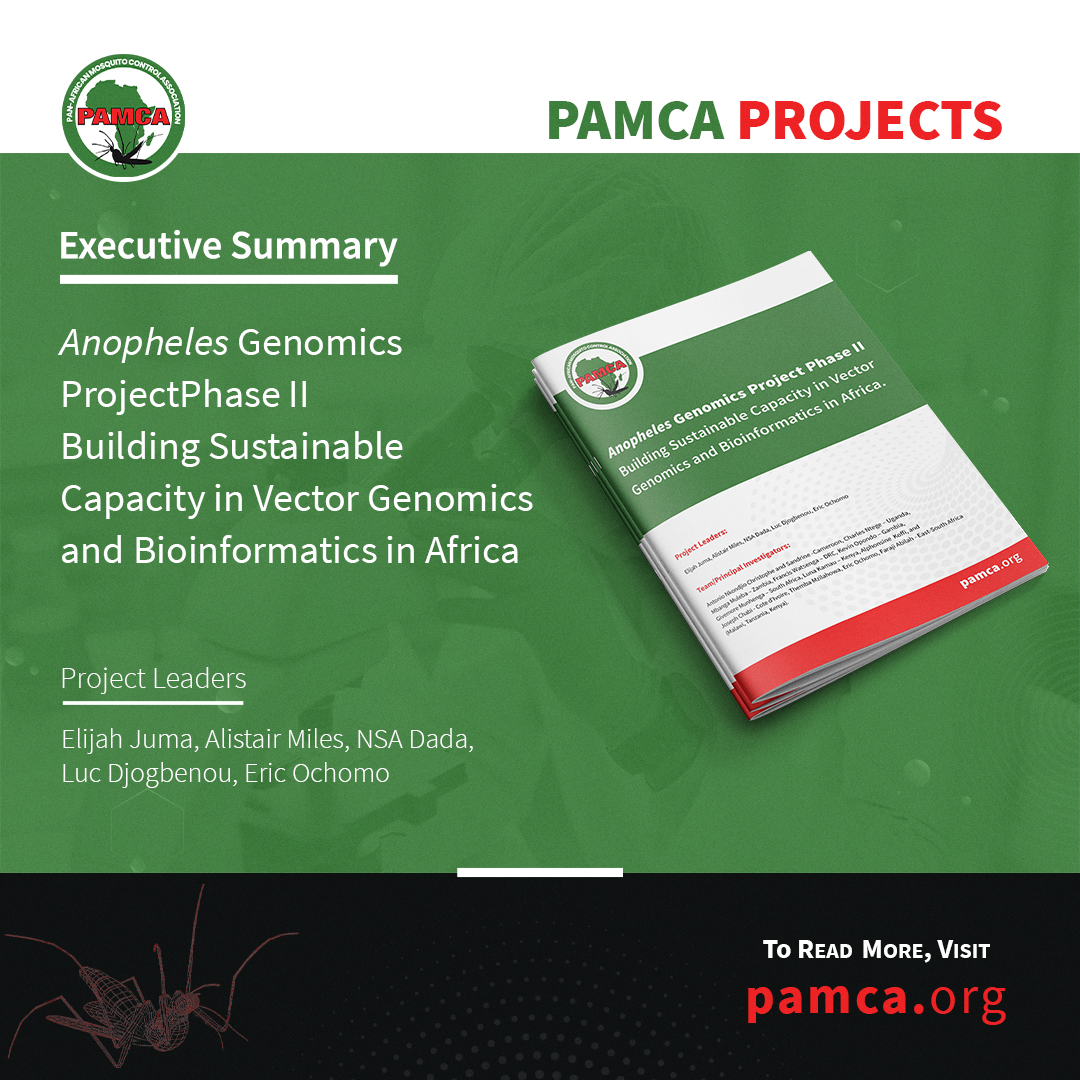Project Title : Anopheles Genomics Project Phase II Building Sustainable Capacity in Vector Genomics and Bioinformatics in Africa.
Start Date: 2021-06-01
End Date: 2023-06-01
Institution
Team
Project Leaders:
Elijah Juma, Alistair Miles, NSA Dada, Luc Djogbenou, Eric Ochomo
Team/Principal Investigators:
Antonio Nkondjio Christophe and Sandrine -Cameroon, Charles Ntege – Uganda, Mbanga Muleba – Zambia, Francis Watsenga – DRC, Kevin Opondo – Gambia, Givemore Munhenga – South Africa, Luna Kamau – Kenya, Alphonsine Koffi, and Joseph Chabi - Cote d'Ivoire, Themba Mzilahowa, Eric Ochomo, Faraji Abilah - East-South Africa (Malawi, Tanzania, Kenya).
Funding
https://www.pamca.org/en
Executive Summary
Executive Summary
Advancements in molecular biology tools have led to expansion in genomic disease surveillance, particularly in vector borne disease (VBD) research. This is exemplified by the progress of phase I of the project and targeted at exploring the genetic diversity of the Anopheles gambiae complex, the primary malaria vector in Africa, and its associations to various phenotypes, with specific focus on vector genomics. Phase I of this project is currently funding nine projects across eleven different African countries exhibiting different levels of malaria endemicity. While the use of genomic data for vector surveillance is gaining popularity in Africa, a critical mass of researchers who can adequately apply this approach to malaria vector surveillance and control is needed to reap and sustain its benefits. So far, ‘Global North-South’ collaborative initiatives are being established to allow for easier access to the sequencing infrastructure, resulting in large amounts of data that are not being processed and analyzed in Africa, as is the case for the Anopheles genomics project phase I. While the software required to analyze the data generated from these projects is readily available, the computing infrastructure as well as technical skills are very limited on the continent. These factors represent huge gaps in the utility and application of genomic tools for improving malaria vector surveillance and control.
Rationale and objective
With oversight and coordination by PAMCA, all the phase I projects are currently being implemented through close collaborations between individual African institutions and the Wellcome Sanger Institute (WSI), UK, who conduct the sample processing and upstream bioinformatics analysis. This setup results in preprocessed data for downstream analysis (analysis-ready data), that the Principal Investigators (PIs) can be trained to analyze and utilize to inform genomic vector surveillance in collaboration with National Malaria Control Programs (NMCPs/NMEPs).
However, this model results in a gap (in term of skills) in the data acquisition and processing steps. To fill these gaps, phase II of this project involves establishing the minimum capacity required for processing and utilizing the data generated from the phase I projects, with local inbuilt capacity for continuity, to create a decentralized platform that will allow full access to all generated data and to initiate continuous sampling for mosquito genomics surveillance.
Project’s overall approach:
The project’s overall approach is to establish
- Adequate capacity required for processing and utilizing the data generated from all the phase I projects, with local in-built capacity for continuity.
- A decentralized platform that will allow full access to all generated data.
- Ongoing sampling for mosquito genomics surveillance. This will specifically involve.
Overall, this project will expand PAMCA and the Sanger Institute’s capacity building portfolios, and strengthen collaborations between both entities, thus promoting skills development and technology transfer for sustainable vector genomics capacity in Africa. With a pan-African reach and working closely with partners in Africa who have the technical expertise to conduct research in vector genomics.
Project’s primary outcomes:
The project’s primary outcomes will be to:
- Procure and establish, in Africa, the basic computing and cloud infrastructure required for collecting, curating, storing, and analyzing mosquito genomics data.
- Train scientists, students, staff of local research and academic institutions, national disease implementing agencies (NMCP/NMEPs) on mosquito genomics and bioinformatics to build the capacity for acquisition and use of genomic surveillance data to guide disease interventions in Africa. The first pool of trainees will be the grantees of the Anopheles genomics project phase I.
- Employ the ‘train the trainers (ToT)’ model to recruit and train at least two qualified bioinformatics candidates and second them for further intensive training on bioinformatics at selected partner institution(s) for a period of 24 months. Upon completion of their fellowship training, the successful fellows are expected to help build capacity in vector genomics and bioinformatics by training additional vector genomics and bioinformatics trainees in the African continent.
- Increase the participation of women in bioinformatics and vector genomics initiatives through deliberate recruitment, training and mentorship programs that target women; closer supervision and support to address the gender barriers to successful participation of women in vector genomics and bioinformatics capacity building initiatives in Africa.

